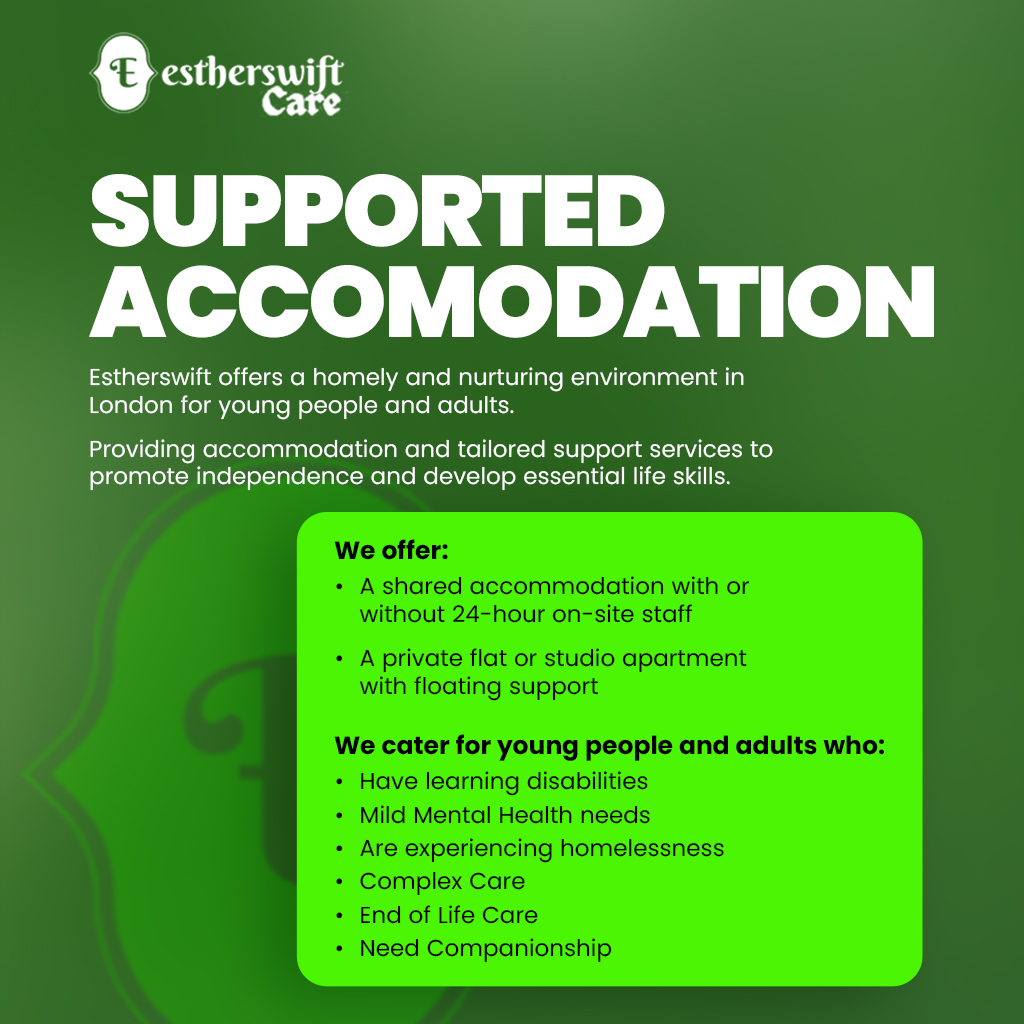
South London and Kent - Young Person Housing Accommodation and 24hr Supported Living

Solo Accommodation
Young people live in have their own private space while still having access to on-site support staff who can provide assistance when needed. This type of accommodation allows individuals to develop their independent living skills while having the security of knowing that support is readily available.

Shared Accommodation
Shared supported accommodation, on the other hand, involves young people living together in a shared house or flat. Each resident has their own bedroom but shares communal spaces such as kitchens, living rooms, and bathrooms. This arrangement encourages social interaction, peer support, and the development of interpersonal skills. Our support staff are also available on-site to provide assistance and ensure the well-being of all residents.
Providing Young Adults with Accommodation and 24 Hour On-site Living Support In London and Kent Areas - OFSTED Rated Excellent
These provisions cater to young people 16 to 18 years old with varying health and social needs. Our accomodations are a small group living environment that provides a homely setting allowing young people to receive targeted support and close supervision. Eliminating the issues of lack of engagement whilst ensuring young people do not feel overwhelmed and or crowded.
Our 24-hour accommodation-based service aims to prevent and/or reduce negative behaviours in young people.
Our dedicated staff carefully monitors and documents every aspect of the young person’s daily living to establish level of independence and areas that requires support to develop.
The nature of our Semi Independent Living also helps to equip young people with the life skills necessary to live independently.

Provision of accommodation for age 16-18 young adults in South London or Kent who may be homeless and/or require accommodation
It can be difficult for young people to find somewhere to live. Private landlords can be reluctant to let to younger people, especially if they are claiming welfare benefits. Young people might have low incomes and a lack of resources, which can make it difficult to access and pay for private rented accommodation.
Estherswift Care provides friendly, welcoming and non-judgmental shared homes and accommodation for young people to live for a set period of time. We encourage young people to succeed, introduce life skills and encourage them to take responsibility for achieving their goals. Our social housing options specifically designed to cater to the needs of young individuals who require assistance with their health and social care.
These accommodations aim to provide a safe and supportive environment where young people can live independently or with others while receiving the necessary support services. The young people we support may have various health and social care needs, including physical disabilities, mental health conditions, learning disabilities, or other complex needs, at Estherswift Care we offer tailored support services to meet the individual needs of each resident. This may include assistance with personal care, medication management, emotional support, life skills training, access to education or employment opportunities, and help with managing finances.
Emergency Placement
In situations where there is an urgent need for temporary or short term care, we are able to provide accommodation and support at short notice. The placement may occur through breakdowns in care home placements, foster care or when a young person needs to be bailed from custody at the local police station. Emergency placement is done without planning or thorough assessment to safeguard their well-being and to keep them safe. This is an emergency staffed service that will also cover waking night where it is needed, depending on the level of risk at the time of placement.

Young Adults Shared Accommodation Social Housing Support
We offer a variety of temporary and permanent accommodation if you’re looking for a home and have additional care or support needs.Our young people are generally responsible for themselves and our role is to support them and provide them with guidance in accessing and planning for services that are relevant to their needs and aspiration.
People become homeless for a whole range of complex and overlapping reasons. So, we offer a variety of housing and support options for families and single people who are homeless or may be faced with homelessness.
We also have a small number of temporary housing schemes for families fleeing domestic abuse.
As we prepare young people’s for independence, our staff also work with them providing support with building basic life skills and knowledge that they’ll need in order to be able to live fully independently. Our support will include:
- Routines and boundaries
- Support with emotional, mental health, family contact, religious and cultural needs / preferences.
- Safety and self-harm reduction
- Socialising and community integration and managing emergencies,
- Obtaining independent accommodation and accessing a tenancy
- Joining the housing register and support with bidding for council properties.
Young Adult Independent Shared Housing and On-site Supported Living

Helping someone out of homelessness is often about more than putting a roof over their head. Underpinned by the skills and experience of our supported housing team, we support residents who may have complex and varying needs.
We offer a variety of individual support, including:
- support with health needs (including mental health, drug and alcohol use)
- personal development work and daily living skills
- confidence building and relationship support
- benefit advice and support on managing finances
- debt and maximising income
- advice on finding employment, education and training.
Shared living empowers you to connect with other people who might also want to live independently but aren’t ready to live alone.
Our young adults at Estherswift care benefit from having their own personal room, whilst socialising with their housemates. Within this framework paid support can be provided in several ways, including staff employed by a social care provider agency or charitable organisation. Although support is individualised, people living together in the same house can and often do still share some elements of basic support.
Social services has duties and powers to provide financial support to care leavers up to the age of 21. This can continue until the young person is 25 if they are pursuing education or training.




